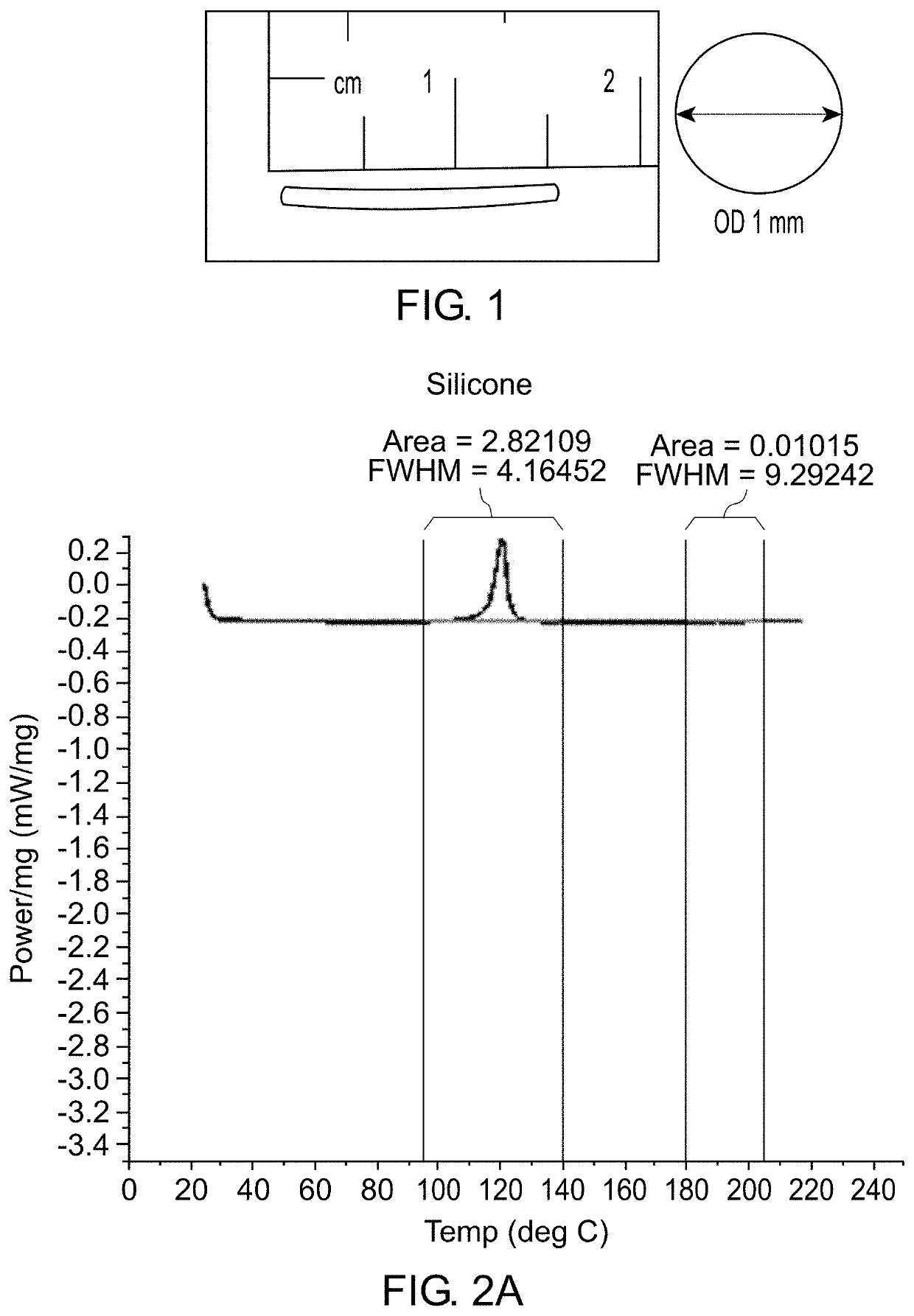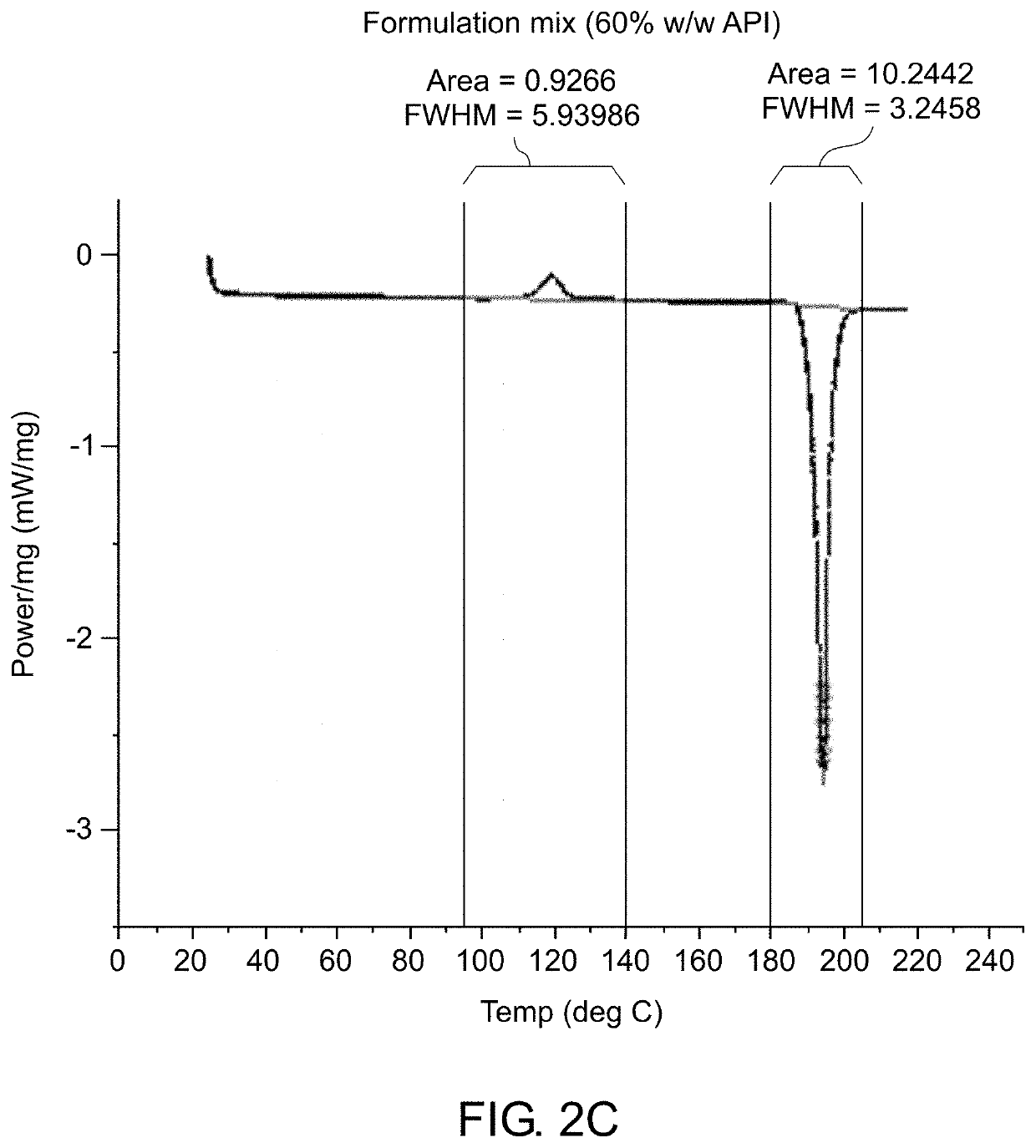Implantable drug delivery devices for localized drug delivery
a technology of localized drug delivery and implantable drug, which is applied in the direction of pharmaceutical delivery mechanism, nitrile/isonitrile active ingredients, medical devices, etc., can solve the problems of prostate cancer cells being generally very susceptible to treatment, painful and functional limitations, and significant burden of suffering from prostate cancer in the united states, so as to reduce or eliminate the toxicity of drugs, the effect of high concentration
- Summary
- Abstract
- Description
- Claims
- Application Information
AI Technical Summary
Benefits of technology
Problems solved by technology
Method used
Image
Examples
example 1
or Making Implants
[0182]Manufacture of the implant included two main steps: formulation of the active pharmaceutical ingredient (API) (e.g., bicalutamide) with an elastomer (e.g., heat cured silicone) to ensure uniform mixing of the API within the polymer matrix, and molding of the implants to ensure the product can be deployed to the organ as intended.
[0183]Formulation
[0184]The implant formulation included medical grade silicone as an excipient mixed with the API. A solvent was used for reducing the viscosity of the silicone, if needed, to incorporate the desired API loading.
[0185]The 60% w / w bicalutamide formulation was made using a centrifugal mixer (FlackTek DAC400-VAC). The required amount of silicone Part A and Part B were added to the mixing cup and an equal weight of a solvent (that dissolves silicone; e.g., pentane) was added. The silicone and solvent were speed-mixed until the viscosity of the silicone was reduced such that it flowed. The API powder was then incorporated i...
example 2
ization of Bicalutamide Containing Formulation and Implants
[0191]Various analytical techniques were used for characterization of the formulation and molded implants. Differential Scanning calorimetry (DSC) was used to determine the rate of curing of the implants and to confirm that crystalline properties of the drug were not impacted. Deployment of implant in cow tongue was used to assess adequate deployment of the implant due to its tissue properties which are comparable to the prostate. The method for deployment is described. Elution Testing was used to assess the rate of elution of drug from the implant. A viscometer was used to assess the viscosity and curing profile for the formulation to confirm that process parameters used are capable of molding cured rods. High Pressure Liquid Chromatography (HPLC) was used to confirm content uniformity and assess impurities in the drug formulation and molded rods. Simulated in vivo stability assay was used to assess the ability of degradant...
example 3
of a Drug Implant of the Disclosure Implanted into the Prostate of Canines
[0202]In this study, three canines, at least fifteen months old, were employed. Each canine received two active implant devices containing 60% by weight of bicalutamide (˜8.4 mg) / Silbione Biomedical LSR D370 silicone in a 15 mm long by 0.95 mm diameter rod. An 18-gauge brachytherapy needle (OD 1.27 mm) was used for device implantation. Clinical observations and body weight were recorded. Blood was collect at frequent intervals for determination of plasma bicalutamide concentrations and for clinical chemistry evaluation. After 55 days of observation, animals were euthanized and gross necropsy conducted, implanted devices were retrieved, and tissues (including prostate) were collected for histopathological examination and bicalutamide quantitation.
[0203]Live Animal Component
[0204]During surgical implantation, a single device was placed into each lobe of the prostate without complication. Placement of devices was...
PUM
| Property | Measurement | Unit |
|---|---|---|
| volume | aaaaa | aaaaa |
| length | aaaaa | aaaaa |
| length | aaaaa | aaaaa |
Abstract
Description
Claims
Application Information
 Login to View More
Login to View More - R&D Engineer
- R&D Manager
- IP Professional
- Industry Leading Data Capabilities
- Powerful AI technology
- Patent DNA Extraction
Browse by: Latest US Patents, China's latest patents, Technical Efficacy Thesaurus, Application Domain, Technology Topic, Popular Technical Reports.
© 2024 PatSnap. All rights reserved.Legal|Privacy policy|Modern Slavery Act Transparency Statement|Sitemap|About US| Contact US: help@patsnap.com










